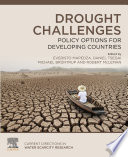External publications

Drought challenges and policy options: lessons drawn, and the way forward
Tsegai, Daniel / Michael BrüntrupExternal Publications (2019)
in: Everisto Mapedza / Daniel Tsegai / Michael Brüntrup / Robert McLeman (eds.), Drought challenges: policy options for developing countries (Current Directions in Water Scarcity Research 2), Amsterdam: Elsevier Science, 325-336
ISBN: 978-0-12-814820-4
DOI: https://doi.org/10.1016/B978-0-12-814820-4.00022-5
Information
The impacts of droughts include threats to water supplies needed for domestic and livestock consumption, agricultural production, transportation, human health and sanitation. Drought-induced water scarcity adversely affects food security in developing countries through direct impacts on food availability and reducing agricultural incomes, and indirectly by exacerbating food price volatility. This can in turn raise migration pressures and trigger resource conflicts and civil tensions in high risk areas. Yet despite these well-documented impacts, progress on drought preparedness has been slow. With the impacts of climate change and land degradation being increasingly felt, a paradigm shift from “reactive” and “crisis-based” approach towards a more “proactive” and “risk-based” drought management approach is indispensable. The critical components of a proactive approach to drought management combine monitoring and early warning systems with impact and vulnerability assessments and risk mitigation measures. These enhance not only the capacity to forecast and monitor the onset, location and intensity of droughts, but also improve communications and coordinate responsive actions between governments, institutions, and vulnerable communities. Although good progress has been made in drought monitoring and management, there remain many challenges. The edited volume "Drought challenges - policy options for developing countries" has identified and described many of the more pressing of these challenges and readers will hopefully have benefitted from the empirical insights from examples from across the globe and the many policy options that have been suggested, which may be taken up and adapted for more effective management of drought in the future, and contribute to sustainable development and enhanced wellbeing of vulnerable populations. In this last chapter, we summarize the key messages in preceding chapters and offer some concluding remarks for moving forward.
Contact
Cornelia Hornschild
Publication Coordinator
E-mail Cornelia.Hornschild@idos-research.de
Phone +49 (0)228 94927-135
Fax +49 (0)228 94927-130
Alexandra Fante
Librarian/ Open Access Coordinator
E-Mail Alexandra.Fante@idos-research.de
Telefon +49 (0)228 94927-321
Fax +49 (0)228 94927-130



![[Translate to English:] Photo: Alexandra Fante, Bibliothekarin/Open Access-Koordinatorin](/fileadmin/_processed_/f/0/csm__c_Deutsches-Institut-fuer-Entwicklungspolitik_Fante_94ce4fa1ba.jpg)